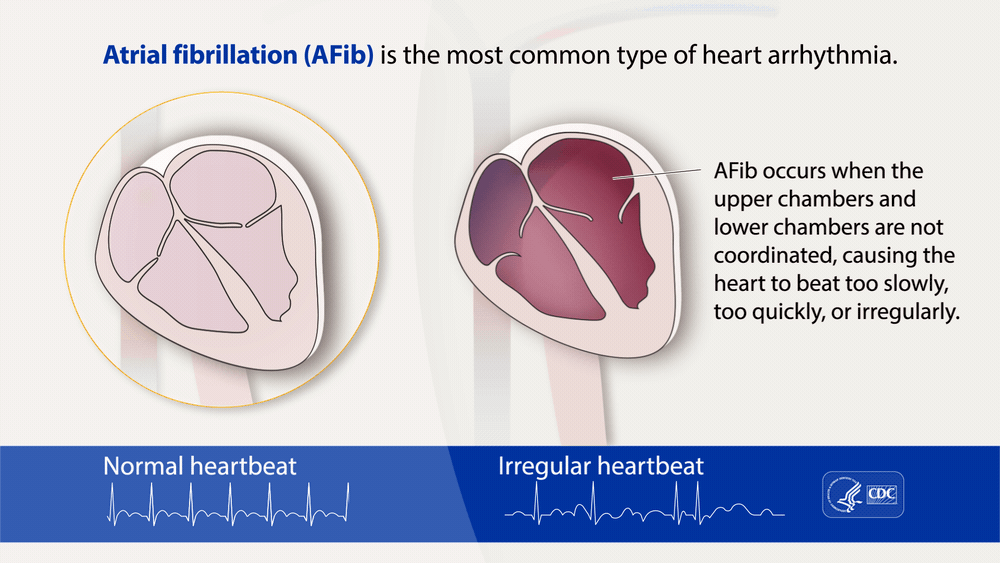What is AFib?

Atrial fibrillation (AFib) is a heart rhythm disorder characterized by irregular heartbeats in the heart’s upper chambers, called the atria. In AFib, the electrical signals that regulate the heartbeat become abnormal, causing the heart to beat too fast or slow instead of contracting normally. Atrial fibrillation can have detrimental effects such as stroke, heart failure, and blood clots.

Image Credit: cdc.gov
As a result of the irregular heart beatings, a variety of symptoms can be present such as:
- Palpitations (fluttering, pounding, or rapid sensation)
- Shortness of breath
- Fatigue
- Weakness
- Dizziness / lightheaded
- Chest pain
In some cases, people with AFib may not experience any symptoms, making it difficult for some people to tell whether or not they may have AFib.
Some broader symptoms can include:
- Abrupt weight gain
- Coughing or wheezing
- Fainting
- Nausea and appetite loss
- Depression
Sometimes even these broader symptoms can not help people determine if they have AFib. The only way for people to know if they have AFib without experiencing any symptoms is to get tested and diagnosed by a doctor. It is strongly recommended that if a person has any of the risk factors below, they get checked, just to be safe, by a doctor.
AFib is often seen in older adults, with risk factors that include:
- History of heart disease
- High blood pressure
- Advancing age
- Obesity
- Diabetes
- Heart failure
- Hyperthyroidism
- Chronic kidney disease
- Smoking or excessive alcohol use
Some treatments are more effective when delivered in the early stages of AFib, which means that a person should not postpone getting checked by a doctor for AFib. However, symptoms and causes of AFib can often differ between men and women. In women, AFib usually is caused by problems with the heart valves. Compared to men, where AFib usually stems from coronary artery disease (CAD). As a result, women with AFib have a greater chance of having a stroke than men with AFib. Women with AFib also are more likely to have heart attacks and congestive heart failure than men with AFib. As a result, treatments for men and women often differ slightly.
Treatment for AFib is typically a medication to control heart rhythm and prevent blood clots. However, in some cases, procedures such as electrical cardioversion, ablation, or implantation of a pacemaker or defibrillator may be necessary. Men with AFib are often placed on non-drug therapies such as pacemakers and catheter ablation. Women with AFib are more likely to have a cardioversion and be prescribed antiarrhythmic medications such as dofetilide. However, typical treatments for both men and women include blood-thinning medications, surgery, and lifestyle changes to manage AFib risk factors.
Written by: Sofia H. Davila, Clinical Researcher
Sources:
Miller, K. (2022, December 27). Atrial fibrillation: The difference between men and women. Healthgrades. Retrieved February 17, 2023, from https://www.healthgrades.com/right-care/atrial-fibrillation/atrial-fibrillation-the-difference-between-men-and-women
Centers for Disease Control and Prevention. (2022, October 14). Atrial fibrillation. Centers for Disease Control and Prevention. Retrieved February 17, 2023, from https://www.cdc.gov/heartdisease/atrial_fibrillation.htm




